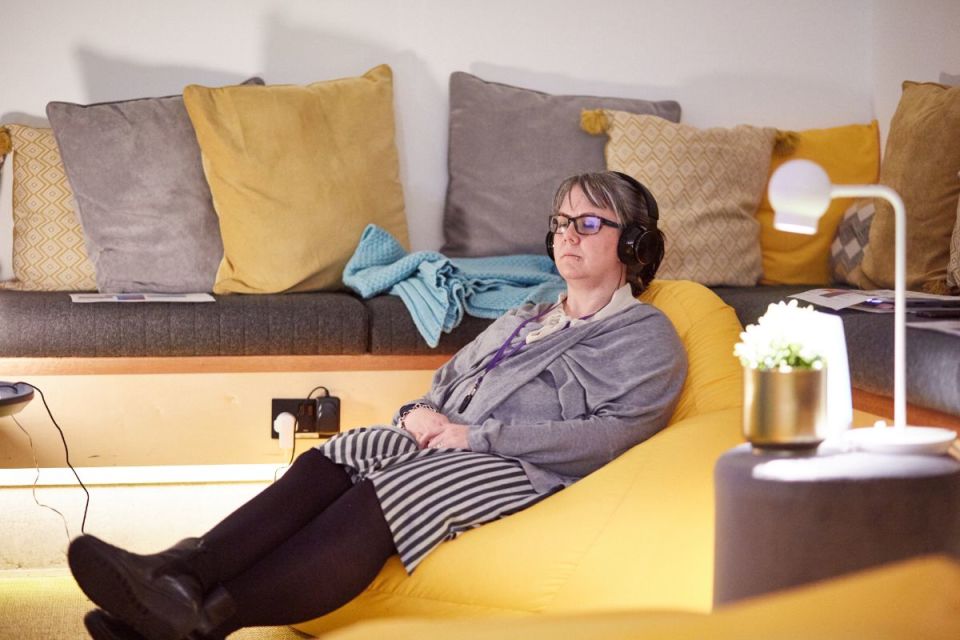Stress Awareness Month employee wellbeing
By Bruntwood Works

Stress Awareness Month has been held every April since 1992 by the Stress Management Society to help increase awareness about both the causes and cures for stress.
According to the Mental Health Foundation, 74% of adults in the UK have felt so stressed at some point over the last year that they have felt overwhelmed or unable to cope. So while the awareness month has been running for almost 30 years now, it’s clear the modern stress epidemic is still rife among society and we have a long way to go.
Stress in the time of coronavirus
The pandemic and the restrictions we’ve had to endure to control the virus have taken their toll on the population over the past 12 months. Research by the Stress Management Society and Huawei showed that two thirds of people in the UK have felt more stressed since restrictions began due to “feelings of disconnection, uncertainty and a worrying loss of control.” Right now, managing stress may feel overwhelming. While we may have “got used to” life under restriction over the past year, that doesn’t mean that it is easier to cope with. As social beings, having our contact and freedoms limited can cause major stresses for everyone. The most crucial thing you can do when you are stressed or anxious is to make sure you are continuing to look after yourself. Make time to relax when you need to and learn to say no to requests that are too much for you.
Stress and Work
According to a recent study by ORACLE and Workplace Intelligence, 78% of participants felt that the pandemic had negatively affected their health, and 76% believe that their employer should be doing more to protect the mental health of their workforce.
Stress at work has been an issue for many years, if not decades, with the pandemic only amplifying the issues. Pre-pandemic, in 2019/20, 828,000 workers suffered from work-related stress, depression or anxiety, with 17.9 million working days lost due to this.
It’s important that businesses work closely with colleagues to reduce the stigma that is associated with stress by talking about issues freely and without judgement. At Bruntwood, we’ve created a thorough wellbeing programme that aims to breakdown that stigma and provide our colleagues with open, safe spaces to talk about their stress, as well as providing resources to help them manage any issues that they’re facing. Whether it’s by talking to our dedicated ‘Wellbeing Champions’, discussing problems with the managers or accessing our ‘Wellbeing Toolkit’ we want to ensure all of our colleagues have the forums and coping mechanisms to deal with stress, now and in the future.
Managing stress
So what can you do to relieve stress and help your workers to be more mindful of their wellbeing and stress levels? Over the month, we’ll be speaking to experts from across our business, as well as some of the amazing partners we work with that specialise in wellbeing to help you manage your own, and your colleagues’, stress and wellbeing. But for now, here's just a few top tips from Bruntwood's People team.
Take some time out It goes without saying that work is important for most people, but during periods of increased stress or anxiety, making sure to take some time out can avoid burnout and get mental health back on track. Emphasize self-care. Exercise, sleeping, and eating healthily can be difficult when overly stressed, but taking these steps will really help combat that feeling of being overwhelmed.
Talk to your manager Reaching out to someone can help, particularly if there’s already a good existing relationship. A manager should be able to put measures into place during work hours that allow their team to get the support needed, whether that is extra help, an extended deadline, or just a regular one-to-one chat. Be open with those that can help professionally; otherwise, things are more difficult to change.
Reduce the stigma Even in 2021, mental health can be stigmatized, and it can be difficult for sufferers to talk about the topic openly. Many fear judgments or a negative response from colleagues when discussing their own mental health problems. This can result in situations shrouded in secrecy, such as being dishonest about why time off is required. Teammates can help by talking compassionately about the subject and offering support. Having open lines of communication breaks down the taboo and helps to remove the fear of discrimination.
Share coping mechanisms One of the few positives about the COVID-19 pandemic is that we are all experiencing it collectively, and many have developed new techniques to cope with stress. Sharing techniques with colleagues, and being open about existing stressors in daily life, can help sufferers feel less alone.
Work isn’t everything at Bruntwood. And while we do offer the opportunity to work of course, it’s just as important to us that all colleagues also find that all-important balance. Find out more about wellbeing at Bruntwood.
Stay Connected!
Sign up to our newsletter for the latest news, updates and offers.